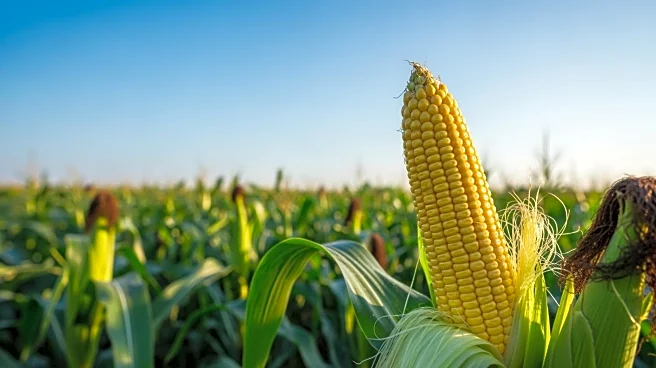What's Happening?
The U.S. Department of Agriculture (USDA) is emphasizing the critical role of biofuels, particularly ethanol and renewable diesel, in shaping the future of American agriculture. This focus was highlighted
during a presentation at the S.E. Asia-U.S. Agricultural Cooperators Conference in Jakarta, Indonesia. The USDA underscores the importance of the Renewable Fuel Standard, which has significantly influenced corn and soybean markets over the past two decades. The framework known as the '4-Rs+1'—Reliable, Resilient, Resourceful, Redundant, and Regenerative—defines the strength of the U.S. agricultural supply chain. This framework supports the production and export of biofuels, ensuring the U.S. remains a leader in global agriculture.
Why It's Important?
The emphasis on biofuels is crucial as it aligns with global energy demands and sustainability goals. The Renewable Fuel Standard has been a transformative policy, boosting ethanol production and supporting the agricultural economy. This has allowed the U.S. to maintain a competitive edge in global markets, particularly in Southeast Asia, where demand for calories is rising. The focus on renewable diesel has also increased the demand for soybean oil, showcasing the adaptability of U.S. agriculture. This strategic direction not only supports domestic energy needs but also enhances export opportunities, reinforcing the U.S.'s role in global food security.
What's Next?
Looking forward, the USDA plans to balance biofuel production with food and feed demands. This involves managing the decline in corn use for ethanol and the rise of renewable diesel to avoid over-reliance on single markets. Investments in infrastructure, such as grain storage and transportation, are deemed critical to maintaining supply chain efficiency. The USDA also emphasizes sustainable practices like cover cropping and precision agriculture to ensure long-term productivity and resilience against climate and market uncertainties.
Beyond the Headlines
The focus on biofuels reflects broader trends in sustainable agriculture and energy independence. By adhering to the '4-Rs+1' framework, U.S. agriculture is positioned to address challenges such as climate change and market volatility. This approach not only supports economic growth but also promotes environmental stewardship, ensuring that agricultural practices contribute positively to the ecosystem.








